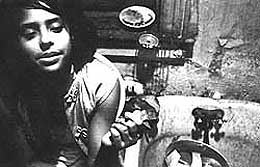On November 28, 1968, Seattle’s first Black Film Festival opens for a four-day run. More or less organized as a fundraising event, the festival is designed to benefit a proposed filmmaker's workshop through CAMP, the Central Area Motivation Project. Two complete shows are held each evening, at 7 and 9:30 p.m., at CAMP headquarters, located at 722 18th Avenue. Tickets are $1 at the door.
Small but Significant Lineup
Three full-length feature films constituted the main portion of the festival, with short films rounding out the bills. All reflected the vision and talent of black filmmakers. “The purpose of this first Black Film Festival is to launch ... [CAMP's] newest activity -- its filmmaker’s workshop,” announced Douglas Barnett, director of CAMP’s Performing Arts Department. “We hope to compare notes by bringing in the best films of other [community] groups and sharing, in turn, what our group will most certainly produce” (Hinterberger).
The festival kicked off on Thursday, November 28, with the feature Nothing But a Man, plus the shorts The Jungle and Remembrance. (Remembrance had taken 2nd prize at the Bellevue Film Festival earlier that year.) The program the next day consisted of four short films -- The Game, previously honored at the Venice Film Festival, The Ghetto, Where We Live, and You Dig It. On Saturday, November 30, the feature was The Cool World, with repeat screenings of Remembrance and The Jungle. America’s in Real Trouble, a short film that took first prize in the 1967 Bellevue Film Festival, rounded out the bill. Finally, on December 1, the closing day of the festival, the feature film was One Potato, Two Potato, along with the short subjects The Jungle, Tempest, and Black Power.
The highlight of the CAMP festival was the special program scheduled for Friday, November 29th. Woodie King Jr., head of the Youth Cultural Arts Program in New York, spoke on a filmmaking project he had organized within his own group. A screening that highlighted some of his students' work followed -- each of the four short films were made by young African Americans aged 16 to 20, and all were made through the Youth Cultural Arts Program.
CAMP’s efforts to establish their own filmmaker’s workshop had already received significant community support by the time the festival was held. A grant from the Seattle Foundation, coupled with access to equipment and the professional advice through King Screen Productions, a division of King Broadcasting, went a long way toward getting the program off the ground. “Other sources of funding must be found if this project is to continue, as it must and should,” Barnett added.
First Rate First Run Competition
CAMP’s Black Film Festival was modest by anyone’s standards, but played an effective role in raising not only funds but also awareness of the group’s community efforts in the Central Area. Even so, the festival was not widely publicized and failed to reach a broad audience -- a fairly difficult task given the choices faced by Seattle moviegoers at the time.
In November 1968, the marquees of local movie houses were jammed with first-run features, many of which are now considered classics of the screen: The Graduate, starring Dustin Hoffman, was in its 50th week at the Town; Stanley Kubrick’s 2001: A Space Odyssey was in its seventh month at the Cinerama; and the animated Beatles' film Yellow Submarine was drawing rave reviews at the Blue Mouse Theatre, where it debuted the same day as the CAMP festival.
Other pictures playing in and around Seattle included the spaghetti western Hang-Em High with Clint Eastwood; Jack Lemmon and Walter Matthau starring in Neil Simon’s The Odd Couple; Jane Fonda in the futuristic Barbarella; and Peter Sellers in the James Bond spoof Casino Royale. Revival screenings were playing to large crowds as well, with Snow White and the Seven Dwarfs and West Side Story, among others, vying for audience attention.
Food and Shelter More than the Arts
CAMP’s efforts in 1968 resulted in Seattle’s first Black Film Festival, but it does not appear that the filmmaker's workshop formed a long-term component of the group’s activities. Still in operation today, CAMP -- in part an outgrowth of President Lyndon B. Johnson’s “War on Poverty” -- has stayed closer to its original vision, helping organize and deliver services to the Central Area community. These include work with various housing and employment programs, operating a food bank, and providing youth and family services.

